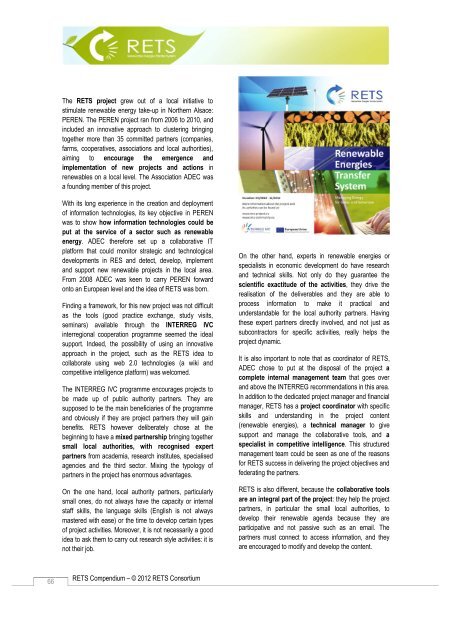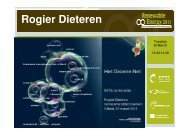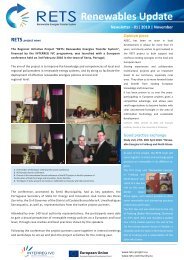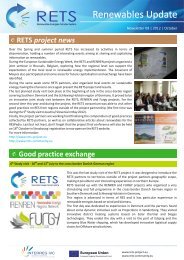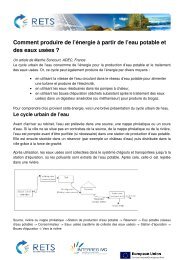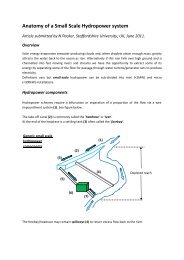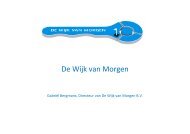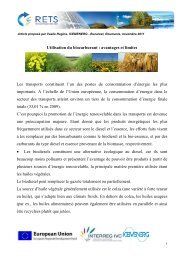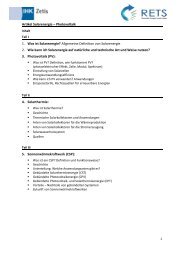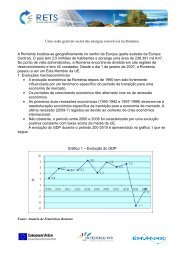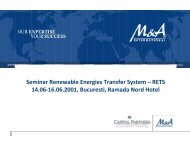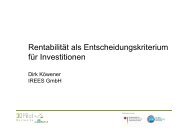Promoting renewable energies - RETS Project
Promoting renewable energies - RETS Project
Promoting renewable energies - RETS Project
You also want an ePaper? Increase the reach of your titles
YUMPU automatically turns print PDFs into web optimized ePapers that Google loves.
The <strong>RETS</strong> project grew out of a local initiative to<br />
stimulate <strong>renewable</strong> energy take-up in Northern Alsace:<br />
PEREN. The PEREN project ran from 2006 to 2010, and<br />
included an innovative approach to clustering bringing<br />
together more than 35 committed partners (companies,<br />
farms, cooperatives, associations and local authorities),<br />
aiming to encourage the emergence and<br />
implementation of new projects and actions in<br />
<strong>renewable</strong>s on a local level. The Association ADEC was<br />
a founding member of this project.<br />
With its long experience in the creation and deployment<br />
of information technologies, its key objective in PEREN<br />
was to show how information technologies could be<br />
put at the service of a sector such as <strong>renewable</strong><br />
energy. ADEC therefore set up a collaborative IT<br />
platform that could monitor strategic and technological<br />
developments in RES and detect, develop, implement<br />
and support new <strong>renewable</strong> projects in the local area.<br />
From 2008 ADEC was keen to carry PEREN forward<br />
onto an European level and the idea of <strong>RETS</strong> was born.<br />
Finding a framework, for this new project was not difficult<br />
as the tools (good practice exchange, study visits,<br />
seminars) available through the INTERREG IVC<br />
interregional cooperation programme seemed the ideal<br />
support. Indeed, the possibility of using an innovative<br />
approach in the project, such as the <strong>RETS</strong> idea to<br />
collaborate using web 2.0 technologies (a wiki and<br />
competitive intelligence platform) was welcomed.<br />
The INTERREG IVC programme encourages projects to<br />
be made up of public authority partners. They are<br />
supposed to be the main beneficiaries of the programme<br />
and obviously if they are project partners they will gain<br />
benefits. <strong>RETS</strong> however deliberately chose at the<br />
beginning to have a mixed partnership bringing together<br />
small local authorities, with recognised expert<br />
partners from academia, research institutes, specialised<br />
agencies and the third sector. Mixing the typology of<br />
partners in the project has enormous advantages.<br />
On the one hand, local authority partners, particularly<br />
small ones, do not always have the capacity or internal<br />
staff skills, the language skills (English is not always<br />
mastered with ease) or the time to develop certain types<br />
of project activities. Moreover, it is not necessarily a good<br />
idea to ask them to carry out research style activities: it is<br />
not their job.<br />
On the other hand, experts in <strong>renewable</strong> <strong>energies</strong> or<br />
specialists in economic development do have research<br />
and technical skills. Not only do they guarantee the<br />
scientific exactitude of the activities, they drive the<br />
realisation of the deliverables and they are able to<br />
process information to make it practical and<br />
understandable for the local authority partners. Having<br />
these expert partners directly involved, and not just as<br />
subcontractors for specific activities, really helps the<br />
project dynamic.<br />
It is also important to note that as coordinator of <strong>RETS</strong>,<br />
ADEC chose to put at the disposal of the project a<br />
complete internal management team that goes over<br />
and above the INTERREG recommendations in this area.<br />
In addition to the dedicated project manager and financial<br />
manager, <strong>RETS</strong> has a project coordinator with specific<br />
skills and understanding in the project content<br />
(<strong>renewable</strong> <strong>energies</strong>), a technical manager to give<br />
support and manage the collaborative tools, and a<br />
specialist in competitive intelligence. This structured<br />
management team could be seen as one of the reasons<br />
for <strong>RETS</strong> success in delivering the project objectives and<br />
federating the partners.<br />
<strong>RETS</strong> is also different, because the collaborative tools<br />
are an integral part of the project: they help the project<br />
partners, in particular the small local authorities, to<br />
develop their <strong>renewable</strong> agenda because they are<br />
participative and not passive such as an email. The<br />
partners must connect to access information, and they<br />
are encouraged to modify and develop the content.<br />
66<br />
<strong>RETS</strong> Compendium – © 2012 <strong>RETS</strong> Consortium


